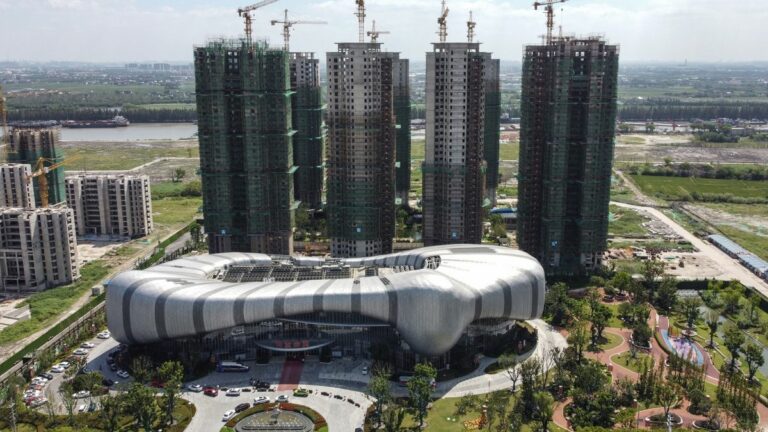Real estate in China: a changing market

Over the past few years, China’s real estate market has been in a state of flux. Prices have been fluctuating and some markets have become less desirable for investors. However, there are still opportunities to be found in Chinese real estate, and anyone considering a investment should carefully assess the current landscape. In this blog post, we’ll take a look at some of the recent changes in the Chinese real estate market and explore what they mean for investors.
Chinese developers buy back bonds at a discount
Struggling Chinese property developers are taking advantage of spiralling costs to buy back dollar bonds at discounted rates.
Cost-Effective Agency
KPI and Results focused. We are the most visible Marketing Agency for China. Not because of huge spending but because of our SMART Strategies. Let us help you with: E-Commerce, Search Engine Optimization, Advertising, Weibo, WeChat, WeChat Store & PR.
Times China Holdings Ltd. Powerlong Real Estate Holdings Ltd. and Agile Group Holdings Ltd. have disclosed a total of $132 million in additional redemptions. All of the notes concerned mature in March or April.
With China’s construction sector facing liquidity problems, Chinese dollar notes have seen their price fall for months. This has led to a record number of defaults. The main source of liquidity has been damaged by the fall in new housing sales. Some builders are taking advantage of bond sales to reduce their debt at prices well below face value.

Overall, the buybacks have not helped sentiment in the sector. Analysts at Jizhou Dong, Stella Guo and Nomura International Hong Kong Ltd. said Powerlong’s buybacks “are one of the best ways to address the market’s concerns about the company’s financial condition as well as to strengthen the market’s faith” in the company.
- Times China announced that it had repurchased $82.8 million of two-dollar bonds from 10 January to 28 February,
- Agile said it had repurchased $44.1 million of its 7.6% bond due March 7, 2007.
- Powerlong announced another $5 million buyback of its 3.9% bond due March 13.
House prices in China rose in January due to efforts to increase property sales.
China’s policies and efforts to increase property sales are paying off
After the revelation of the Evergrande debt scandal, Chinese buyers’ confidence in the local property market was severely affected. Official data released showed that Chinese house prices in January saw a month-on-month increase as lenders and the government implemented measures to increase property sales.
Analysts believe that the January house price data is a positive indicator that the sharp decline in property is beginning to be curbed after appropriate and proactive policy adjustments are made in the fourth quarter of 2021, particularly in financial and credit policies.

Sheng Guoqing (chief statistician of China’s National Bureau of Statistics) said that January saw a reversal of the 0.1 per cent month-on-month decline in December. He reported a 0.6 per cent increase in house prices in China’s largest cities. Beijing rose by 1 per cent and Shanghai by 0.6 per cent.
According to the NBS, 70 large and medium-sized urban areas saw new house prices fall in January. That’s 11 fewer than the previous month. 55 cities also saw a drop in second-hand prices, eight more than in December.
“This shows that the government’s stimulus policy in the fourth quarter of last year, especially the mortgage easing policy, has helped to curb the decline in housing prices,” Yan Yuejin (research director at Shanghai-based Ehouse China R&D Institute) told the Global Times.
The Chinese property market has been under pressure since September. This is due to defaults by Evergrande Group, a heavily indebted developer, and other developers. It also raises concerns about market conditions.
New policies
To stabilise the market, regulators have implemented a number of measures, including the acceleration of mergers and acquisitions by indebted property developers to reduce financing restrictions.
After releasing 1 trillion yuan ($158.05 million) of liquidity, China’s central bank decided to reduce the prime lending rate (PLR) on 20 December, after reducing it for a year.
Some Chinese cities reduced down payment requirements during the Spring Festival holiday to help create demand.
The municipality of Chongqing, in southwest China, says local banks reduced the down payment rate for home loans to 20% for buyers with no previous mortgage history during the Spring Festival. This follows a similar reduction in home loans in Ganzhou in eastern China’s Jiangxi province and in Heze in eastern China’s Shandong province.

Yan said, “The NBS data, coupled with the performance of local banks, points to an easing of mortgage policies that will largely lower home purchase thresholds, which will help activate transactions in the property market.”
China’s top economic planner, the National Development and Reform Commission (NDRC), has released the latest government policy.
According to an NDRC notice, new preferential tax policies are being developed to support real estate businesses. This is part of the NDRC’s efforts to promote steady growth of the industrial economy through various policies.
China will increase pre-tax deductions for equipment purchased by micro, medium and small enterprises (MSMEs), real estate enterprises with operating income of less than 2 billion yuan or assets of less than 100 million.
“In the past, policies favouring MSMEs did not mention real estate enterprises. This marks a change in policy direction. Yan said the policy of tax reduction for equipment and appliances is linked to investment in land and new house construction. This will reduce the pressure on investment in the next cycle.”
Yan said the NDRC standard will cover almost all real estate companies that are not ranked in the top 100 nationwide. This is because most property developers make less than 2 billion yuan a year.
China’s four major banks, including the People’s Bank of China and the Industrial and Commercial Bank of China, have started to lower the interest rate on home loans for first-time home buyers in Guangzhou, Guangdong province (southern China).
The future of real estate
Analysts said that in 2022, new home loan applications will be lower than the strong market demand and tight mortgage environment of the previous year.
According to the Ping An Securities report, home financing will have regulatory protection for reasonable demand. However, homebuyer confidence and real estate business investment confidence need to be urgently strengthened.
There have been monthly improvements in real estate business financing. Ping An Securities reports that the increase in February in the amount of medium and long-term loans to households was 227.2 billion yuan, which is lower than 2021. This reflects the inability of buyers to enter the market.
China’s real estate industry has been an important driver of economic growth for many years. However, its popularity has slowed in 2021, especially in the fourth quarter, due to policy measures to reduce leverage in the property sector.
Dong Dengxin, from the Institute of Finance and Securities at Wuhan University of Science and Technology, said the real estate sector’s contribution to GDP in 2022 would remain at 6.78% of the 2021 level.
Wu Chaoming, chief economist at Chasing Securities, is less confident about the forecast contribution.
If you’re optimistic, property sales and investment will probably turn from negative annual growth to positive growth by mid-year. Wu said that real estate would make a small contribution to GDP for the year as a whole.
Analysts believe that consumer spending will become an important driver of economic growth.
Wang Dan, chief economist of China’s Hang Seng Bank, said traditional drivers such as real estate and infrastructure are needed to achieve stable growth. However, he does not believe they will be the main drivers of China’s economic growth.
The NBS said that China’s consumer spending in 2021 will contribute 65.4% of its economy and 5.3 percentage points of GDP growth. Between 2011 and 2020, China’s consumer spending accounted for 53.3% of GDP.
Analysts believe that consumption will play a bigger role in economic growth than in 2022 because of its huge potential.
Although China faces many problems, there are no easy solutions. The key message of the IMF’s annual Article IV economic review published in January is that China should rebalance towards a more consumption-based model to boost growth prospects in the short and long term.
China’s property balance
China achieved GDP growth of 8.1% in 2013, its highest growth rate in 10 years, despite strong global economic headwinds, including the COVID-19 pandemic. China exceeded the expectations of the International Monetary Fund and far exceeded its own target of 6%.
China’s economic performance may not be as strong as one might expect. This is because the year-on-year growth figures were flattered by the 2020 pandemic, which saw the growth rate fall sharply to 2.3%. China’s growth momentum in the second half of the year was lower than in the first half (12.7%) due to government efforts to control the property sector.

China needs to be cautious. The ratio of annual income to house prices has increased about threefold over the past 20 years. It is now 43.15 in Shenzhen, 42.47 in Beijing and 33.36 in Shanghai. This compares with 13.37 in London, 8.76 in New York and 13.37 in London. Part of the reason for this is a poor distribution of resources. China has built too many skyscrapers and luxury hotels and not enough affordable housing. There is also a need to be careful about speculation.
The government has implemented three major policy measures to stabilise housing prices, reduce commercial banks’ exposure to the sector and force property developers to deleverage. These measures came into effect in 2021. The first was to impose “three red lines on property developers”. In August 2020, the Chinese government declared that a few large developers could not have a liability-to-asset ratio of more than 70%, a net debt-to-equity ratio of more than 100% or a cash-to-current debt ratio of more than 100%. These red lines were imposed last year on the entire real estate sector. Developers who fail to meet these red lines will be subject to stricter debt limits by regulators.
China has also introduced new limits on bank lending to the property sector. The limit on real estate loans for large state-owned commercial banks is 40%. Mortgage lending is limited to 32.5%. Regulators set limits for smaller banks depending on their size.
China has also changed the way local governments sell land rights. It is hoped that the limited number of centralized auctions will help bring prices down.
These measures may help explain why the cumulative growth rate of real estate financing fell from 54.2% in January 2021 to 4.2% in December. The cumulative growth rate of total housing sales rose from 133.4% to 4.8% in square metres and from 104.9% to 1.9% in value over the same period. The cumulative growth rate of property development investment in China fell from 38.3% to 4.4%, which is a significant decline even after taking into account the base effect.
Not surprisingly, the high share of real estate investment has seen total investment growth fall from 35% in January to 4.9% in December 2021. This is not good news for the Chinese economy. Despite the fact that the contribution of investment to GDP growth has fallen considerably since 2010, it remains significant. The economic recovery has been driven by investment demand.
According to a World Bank report from 2020, the share of housing-related activity in China’s fixed asset investment and GDP is now much higher than the levels at which the US was experiencing a housing boom in 2006. The Chinese government has responded to the decline in GDP growth in the third quarter of 2021 by adjusting its policies to limit excessive borrowing by property developers.
The Chinese government has stressed that policies to address structural and financial problems should not hamper economic growth. However, this balance will not be easy to achieve when it comes to the property sector. Given the economy’s dependence on real estate, this could have serious consequences.

The Chinese government should have used more expansive fiscal and monetary policies last year to increase overall growth. To offset the negative effects of the slowdown in real estate investment on economic growth, it should have increased the growth of infrastructure investment. In reality, infrastructure investment grew by only 0.4% last year, compared to 0.9% in 2020.
The good news is that the Chinese government has recently declared that stabilising growth is its top priority. China has a lot of room for expansionary fiscal and monetary policy. Markets are optimistic that China will achieve a growth rate of over 5.5% by 2022. It is hoped that China’s slow GDP growth will end, as it has for more than a decade.
China’s property market is expected to rebound this year
China’s property market will remain soft for the first half of 2022, then rebound later in the year due to a lack of liquidity among developers.
The world’s second-largest economy was once a strong pillar of its property sector. But last year Beijing launched a deleveraging campaign to put major developers out of business. This has disrupted project completion and dampened buyer sentiment.

China is not only facing a cooling property market, but also sporadic outbreaks of COVID-19, which could lead to a decline in industrial production and consumption.
The average house price fell by 1.0% in the first half of this year.
House prices are expected to rise by 2.0% over the year.
“House prices will rise if there are no brakes,” said Li Qilin (chief economist at Hongta Securities), adding that the credit environment has improved slightly since the beginning of the year.
“Property transactions will be significantly better in first- or second-tier cities because of their economic and demographic advantages.”
The authorities have revealed a series of measures to increase sales and sentiment. These include allowing developers to access more pre-sale funds in escrow and requiring lower down payments for first-time buyers. They also allow commercial banks to lower their mortgage rates.
Although analysts are more optimistic about housing demand and supply, they also said that sentiment has not fully recovered and that real estate companies continue to face financial pressures.
Real estate sales are expected to fall 14.0% in the first quarter, compared to a 16.0% decline in the November survey. For the year as a whole, sales are expected to fall by 7.5%.
Respondents said that policies to regulate demand, especially real demand, would be relaxed, but sellers continue to rely on discounts.
Huang Yu, vice president of China Index Academy, a Beijing-based real estate institute, said home buyers are not confident and discounts remain a powerful marketing tool.
“First- and second-tier cities will see an increase in the number of property transactions, which will lead to a structural rise in housing prices nationwide.”
China’s housing minister has pledged to keep the property market stable this year and meet real demand.
Real estate companies are expected to invest 2.0% less in the first half of the year and 1.5% more for the whole year.
The lowest growth rate for 17 months was 4.4% for property investment in 2021. However, property sales increased by 1.9% per region.
Lu Wenxi (chief analyst at Centaline), said that “real estate companies under capital pressure will be cautious about land purchases and real estate investments.”
Daniel Yao, head of China research at JLL, expects the authorities to provide more loans to property companies for project development. They will also make it easier for them to issue bonds to ease pressure on liquidity and stabilise the outlook.






